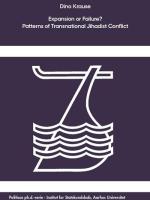Expansion or failure? Patterns of transnational jihadist conflict
Over the past two decades, in various parts of Africa, the Middle East as well as South- and Southeast Asia, local rebel groups decided to give up their former organizational identities and pledge allegiance to al-Qaeda and the Islamic State. These two leading transnational jihadist organizations have thus become involved in conflicts in various countries.
However, there is a lot of variation in these processes: sometimes, al-Qaeda or IS established new local chapters, but these groups were quickly defeated, or never even carried out any attacks in the first place. In other cases, local rebel groups in fact decided to remain autonomous, rather than pledging allegiance to al-Qaeda or IS. What factors can help explain such different outcomes? Why do al-Qaeda and IS sometimes manage to gain a foothold, such as was the case with IS a few years ago in northeastern Mozambique, and why do they sometimes fail in doing so, for example in Myanmar, where both al-Qaeda and IS have long tried to exploit the suffering of the Muslim Rohingya minority for their gains?
In his PhD dissertation, which he defended at Aarhus University in December 2022, Dino Krause investigates the evolution of transnational jihadist conflict – that is, intrastate armed conflicts involving non-state groups linked to al-Qaeda and the Islamic State (IS). Using both quantitative and qualitative methods, he connects the empirical peace and conflict literature and the field of jihadism studies in order to generate insights about both the emergence and the resilience of transnational jihadist conflicts on a large-N level.
The dissertation generates several important findings. As regards the question of emergence, transnational jihadist conflicts are found to be more likely to take place in contexts of highly repressive states. On the other hand, higher levels of bureaucratic state capacity are found to obstruct the ability of al-Qaeda and IS to establish themselves as conflict parties. Moreover, a regional study of South Asia finds that political openness can provide local populations with nonviolent alternatives to express grievances, thereby complicating the rise of al-Qaeda and IS. The South Asian context further shows that when local Islamist groups already make use of external support channels other than al-Qaeda and IS, these latter organizations may appear less attractive as affiliation partners. As regards the question of resilience, the dissertation shows that foreign fighter recruitment and transnational operations, often mentioned as key obstacles for conflict resolution, are not sufficient in explaining the lack of negotiations in transnational jihadist conflicts. Rather, a high degree of variation along both variables is identified amongst a sample of 20 jihadist affiliate groups, suggesting that some of these conflicts may offer avenues for peace negotiations in the future.
DIIS Experts



